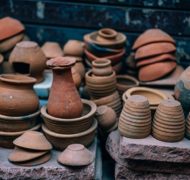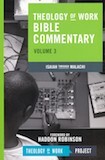Downward Mobility: Refusing God’s Hands: Jeremiah 18 Sermon Notes
Sermon Notes / Produced by The High Calling
The Main Text:
The word which came to Jeremiah from the LORD saying, “Arise and go down to the potter’s house, and there I will announce My words to you.” Then I went down to the potter’s house, and there he was, making something on the wheel. But the vessel that he was making was spoiled in the hands of the potter; so he remade it into another vessel, as it pleased the potter to make. Then the word of the LORD came to me saying, Can I not, O house of Israel, deal with you as this potter does?” declares the LORD. “Behold, like the clay in the potter’s hand, so are you in My hand, O house of Israel.”
Jeremiah 18:1-6 ESV
The Big Idea:
Every day you and I refuse the hands of our Maker. In our natures, we do not want to be in God’s hands. We want to be in our own hands. What is the remedy for this?
The Major Movements:
The Root of Our Refusal – the universal why to our refusal of God’s hands
The Fruit of Our Refusal – the individual’s why to our refusal of God’s hands
The Remedy for Our Refusal – how we overcome our refusal of God’s hands
When God chose Jeremiah to be his prophet, Israel was in turmoil. War was coming from all directions. The message given to Jeremiah from God was clear. Look around. All of this is about to “hit the fan” because we have ALL been disobedient to the will and way of the Lord. And, he has told me that he is going to break us for it. Return to God.
Now, for an entire nation that saw itself as God’s chosen people, nothing could be more upsetting than the thought of losing God’s favor. Or at least you would think that, right? Jeremiah would sit alone. False prophets will rise and slander Jeremiah. “Don’t listen to him. He is a fool.”
Well, God has enough . . . so much so he says to Jeremiah even if Moses and Samuel were standing before me pleading for these people, I wouldn’t help them. Tell them to get out of my sight! And, when they ask where they should go, this will be my reply: “Those destined for death, go to death. Those destined for war, go to war. Those destined for famine, go to famine. Those destined for captivity, go to captivity.” God is angry. But God is also good. It is here that the text begins.
Introduction:
Michelangelo’s final work was called Rondanini Pieta. It was a sculpture of Mary mourning over the murdered body of Jesus. It was a piece he worked on for ten years or so all the way up to the end of his life. It is said that he may have worked on it just a few days before his death and it could possibly be the last piece he ever touched with a chisel. The only problem is the piece is entirely incomplete. A contemporary of Michelangelo’s, wrote that Michelangelo “ended up breaking the block [for this sculpture], probably because [it] was full of impurities and that it was so hard that sparks flew from under his chisel.”
So, what happened? Why after ten years of work would this sculpture still be entirely incomplete? Another sculptor said, the problem and unpredictability of working with stone is that “the stone wants to be stone; the artist wants it to be art.”
This was the problem with Israel. Stubbornness. God tells Jeremiah, “I want you to go down to the potter’s house and there I will reveal my word to you.” So, Jeremiah goes. Remember, God is angry. Jeremiah walks upon a potter with his hands covered in clay working a wheel trying to shape this clay into a vessel—a pot, or bowl, or jug, or something. The potter is trying to shape the clay into whatever it was he intended it to be but it just won’t turn out the way the potter wants it to. So, with his hands, the potter pulls his clay off the wheel and rolls it back up and he turns it into something else. Still to fit his liking but not what he wanted. Jeremiah can’t help but notice this. Think about it—the clay is now a plate instead of a pitcher.
God says, “My people are the clay.” You can feel the heaviness here. The frustration. They just won’t listen. The Bible says the clay was ruined. It was stubborn, unworkable clay. The same problem exists for those of us who are the work of God’s hands. Just as Jeremiah witnesses the stubbornness of the clay in the hand of the potter, we too, are stubborn, aren’t we? Stone that wants to be stone. And so do we.
In our natures, we do not want to be in God’s hands. We want to be in our own hands. The truth is every day you and I refuse the hands of our Maker. What are some examples that would be true for you or those in your congregation? From here we will spend the rest of our time covering a few things. First, there is a universal root, a universal why behind our refusal of God’s hands. And second, there is an individual why. This is the fruit of our refusal. You see, the root is the same for us all, but the fruit or the result looks different. And finally, we need to talk about the remedy for our refusal—the hope that comes to those who stop refusing God’s hands. 1) The root of our refusal. 2) The fruit of our refusal. 3) And the remedy for our refusal.
MVMT 1: The Root of Our Refusal – The Universal “Why?”
So, first let us discuss the universal “why” underneath or the root to our refusal. You all know Israel’s story. God made them a nation out of nothing. He picked a guy named Abram and said, “Hey, I am going to turn you, Abram (yes, you!) into a people... a great nation!” We know God chooses Abram because Abram did not have any people. I could have chosen this people or that people but I wanted to make a people. So that you would know and the world would know that I am God. So God may be glorified! We see over and over, time and time again, they didn’t want to give God glory! They wanted it! And neither do we! We want the glory! We are glory-hungry creatures! Who is getting the glory in your life?
I heard a sermon from a New York City pastor, JR Vassar, in which he discussed this very thing. Vassar said, “You wanna know why you desire glory? Why you crave it? You were made for it.” We were made for glory. We were made for significance. We were made for approval. Go back to our first parents. “God puts them in the garden and what is the verdict that he says over them? ‘This is very good.’ Adam and Eve in the garden were the pinnacle of God’s creation. As Psalm 8 says, they were crowned with glory and honor. God puts them in the garden and says, ‘very good.’ He gives them praise, crowns them with glory and honor, gives them approval, gives them acclaim and says he is pleased with them. They had glory, affirmation, approval, acceptance, acclaim, they had it all from God.”
But, they lost it, Vassar goes on to say. Adam and Eve were deceived. They had all that was intended for them—all that they could possibly need, but they wanted more. Sin enters the picture and strips them of everything, leaving them nothing but naked and ashamed before God. So, they tried to cover themselves with everything. Anything. Created for glory and trying to get it back any way they possibly could. This isn’t just their situation, is it? It is ours too! Grabbing for anything that will give us the sense of being “very good” again. So here we are. Stubborn clay in all OUR glory! On the wheel but refusing the hands of the Maker. This is our sinful nature.
The universal “why” that is underneath our entire refusal is a glory-hungry, sinful self that from here on out we will call our “pride.”
MVMT 2: The Fruit of Our Refusal – The Individual’s “Why?”
At this point it is important to note that the root of why we refuse God’s hands, our pride, reveals itself in different ways for different people—this is the individual’s “why.” If you were to consider Israel, you might suggest they thought themselves to be a better god than God. The prophet Isaiah will talk to God about this very thing to which God says, “Woe to him who strives with him who formed him, a pot among earthen pots! Does the clay say to him who forms it, ‘What are you making?’ or ‘Your work has no handles’?”
Their questioning of God in this way reveals that they thought they knew best. It revealed the nation had unknowingly slipped into a pride-filled people. Could it be that we have too?
How might your pride, your unwillingness to remain in God’s hands, be revealing itself in you? As a pastor, do you think what you do or say is better than what others do or say? Or how about forcing a building campaign through, even though it is clearly not happening? Or, how about holding on to sacred cows—maybe some ministries or programs that no longer help fulfill the mission/vision of the church but yet you keep them around? Do you take it personally when you hear someone speak highly of one of your colleagues? How many within your staff and/or congregation are scared to be honest with you? Do you take pride in the praise you receive after a good sermon? Or maybe you prompt others to prop you up by downplaying something that you did or said. If so, what do you do? What do WE do? What is the remedy for us?
MVMT 3: The Remedy for Our Refusal
The only remedy for our refusal is to let the gospel have us, again. Very few of us would ever say this, but we might just be basing our sense of worth, success, and relevance on moral and spiritual achievements—“God saved me but now it is up to me to buckle my chinstrap and lead this church on my own.” Is this you? You know the right thing to do but deep deep down you know you just don’t do those things enough. You don’t pray enough. You don’t care enough. You don’t serve enough.
You don’t love enough. Are you constantly anxious, insecure, and unstable about where you stand with God? Never really quite sure if you are fulfilling God’s purposes. You think you are . . . but you have to look around first. Remember what the gospel says over you. Contrary to what people think about us, we do not have a relationship with God BECAUSE we live up to his standards. We have not done this well and NEVER will. We have a relationship with God because of the gospel—because of grace. Can we stop trying to be so religious for people and just be obedient—not out of fear of rejection (from both God and our congregations) but in response to the grace that is and has always been there for us?
I have heard it said in Christianity, “You are broken and in Christ. You are not only accepted despite your brokenness, but also because you were willing to admit it.” We may be broken. Stubborn. Ruined clay. But, we are all of these things in his hands, and his hands are good.
Hear the words of Paul:
Therefore, if anyone is in Christ, the new creation has come: The old has gone, the new is here! All this is from God, who reconciled us to himself through Christ and gave us the ministry of reconciliation: that God was reconciling the world to himself in Christ, not counting people’s sins against them. And he has committed to us the message of reconciliation. We are therefore Christ’s ambassadors, as though God were making his appeal through us. We implore you on Christ’s behalf: Be reconciled to God. God made him who had no sin to be sin for us, so that in him we might become the righteousness of God. 2 Corinthians 5:17-21 ESV
It is not just our church members who are on the potter’s wheel. We are on the wheel with them. Remember what the gospel says over you. Rest in it. By your Hands and by your grace, God, make us new.
*****************************************************************************************************************
Rich Roush is currently the Minister of Students at Valley Ranch Baptist Church in Coppell, Texas. Rich and his wife Megan are both graduates of Baylor University, and Rich holds a Master of Divinity degree from Truett Theological Seminary at Baylor University with an emphasis in Theology.
Click here for a PDF of this sermon.
Other sermons in this series on Downward Mobility and Humility at Work:



.jpg)







